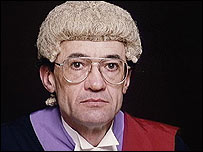Law Weblog
Good result from efforts by court officials
Tuesday 14 March 2006 at 6:38 am | In News | Post CommentMore than one thousand warrants have been executed, criminals arrested and £60,000 in unpaid fines collected following a major effort by courts staff across London to pursue elusive offenders.
The money collected means many victims of crime in the capital will be compensated.
London’s 36 magistrates’ courts began their crackdown last month on thousands of outstanding warrants. A quarter of all unpaid court fines in England and Wales originate from London. Courts chased fines evaders, some of whom had failed to attend court or complete their community service.
A court penalty often includes an order to compensate victims.
The courts flushed out hundreds of criminals by letter, phone call and text, warning them to pay up or suffer the consequences including being sent to jail. One person was jailed for 182 days.
Much of the campaign’s success depended on the element of surprise, and enforcement officers turned up at criminals’ homes at odd times of the day and night when they failed to respond to letters and text messages.
Police stop and search under the Terrorism Act require little more than a hunch
Saturday 11 March 2006 at 1:24 am | In News | Post CommentGillan & another v Commissioner of Police [2006] HL
[Police Powers – stop and search – 44 of the Terrorism Act 2000 – searches under the Act require no suspicion]
D the Metropolitan police controlled demonstrations at an East London arms fair in 2003 using stop and search powers under the Terrorism Act 2000. Police officers of the rank of commander and above can authorise searches under section 44 of the act, for a period of up to 28 days, if they obtain backing from the Home Secretary. Authorisations had been in force for the Greater London area continuously since 19 February 2001. At the demonstration they stopped and search G, a student and Quinton a photo journalist who was covering the event.
Held: The law allows officers to stop and search people and vehicles for articles that could be used in connection with terrorism. Unlike other stop-and-search powers, they may be used whether or not the police have grounds for suspicion.
The use of stop and search, and any consequent violation of human rights, was proportionate under the European Convention on Human Rights and justified in the light of the threat of terrorism.
Lord Bingham said the exercise of the powers by public officials “must be governed by clear and publicly-accessible rules of law”.
“It is an old and cherished tradition of our country that everyone should be free to go about their business in the streets of the land, confident that they will not be stopped and searched by the police unless reasonably suspected of having committed a criminal offence. “So jealously has this tradition been guarded that it has almost become a constitutional principle. But it is not an absolute rule. There are, and have for some years been, statutory exceptions to it.”
He said that an exception can now found in sections 44-47 of the Terrorism Act 2000.
D won
Whole case here
The purposive approach dominant in establishing Parliament’s purpose or policy.
Monday 6 March 2006 at 10:59 pm | In News | Post CommentLady Justice Arden in Commissioners of Customs & Excise v Elm Milk Limited [2006] CA
“The courts have in the last few decades changed their approach to statutory interpretation. Their approach is now less literal than it used to be. A more purposive approach is now often used. This entails that the judge will have a greater role in interpretation than he would have under a purely literal approach since having found the purpose the judge will need to consider whether such purpose is furthered or hindered the interpretation that he favours. That approach will enable the courts further to ensure that an enactment achieves what the legislature intended. But to adopt a purposive approach the court needs to understand as best it can from the words Parliament has used the purpose or policy behind the provisions that the court has to interpret. It may well be that in this case, the judge, as probably often happens, did this silently but it is desirable in the interests of the application of the case in subsequent cases for the court to state the view that it has formed of Parliament’s purpose so it can be seen what part the judge’s perception of the purpose of the statute played in his conclusion.”
The balance of individual rights and the need for police investigative powers, or simple dishonesty?
Sunday 5 March 2006 at 11:00 pm | In News | Post Comment Detective Constable Shirley McKie was wrongly identified as having been present at a crime scene; when she denied having been present she was accused of lying and was tried for perjury in 1999. She was acquitted.
Detective Constable Shirley McKie was wrongly identified as having been present at a crime scene; when she denied having been present she was accused of lying and was tried for perjury in 1999. She was acquitted.
McKie’s thumbprint was alleged to have been found when she was part of a police team investigating a murder in Scotland. At the trial of the alleged murderer she stated that she had not been inside the murder scene. Four experts from the Scottish Criminal Records Office wrongly identified a thumbprint from inside the house as hers and they stand accused of manipulating evidence and covering up errors.
Police and forensic experts not connected with the McKie case believe that mistakes were covered up because if they admitted earlier errors it would leave them open to a scandal.
Donald Findlay QC, who defended McKie in her perjury trial says, “Fingerprint evidence used to be considered as sanct. Now I would be more inclined to challenge it. For all we know, people may have been convicted wrongly on fingerprint evidence, and that is an appalling business”
The point about this story which is 8 years old is that a civil hearing in a Scottish court is underway. Whatever the outcome, the whole fingerprint establishment in the UK and in Scotland in particular are under increasing pressure from critics, and this case will become a cause celebre in the debate over the “balance of individual rights and the need for police investigative powers”.
Website here
Jury accusations that the judge favoured the prosecution lead to the collapse of the trial of a man accused of rape
Friday 3 March 2006 at 10:20 am | In News | Post CommentThe trial was at Swansea Crown Court; the Judge HH John Diehl; the defendant aged 33; the victim a 17-year-old girl; the defence – she had consented.
The jurors accused the judge of “partiality towards the prosecution” in a note that they handed up to him. He immediately told the prosecution and defence barristers ordered a new trial and stood down.
The defendant was acquitted by the new jury in 40 minutes. 
The Judicial Communications Office said there was no record of a similar incident in a crown court. (The Judicial Communications Office was set up in April 2005 to provide external and internal communications facilities for judicial office holders in England and Wales).
Supreme Court plans delayed
Friday 3 March 2006 at 10:05 am | In News | Post CommentLord Falconer, the lord chancellor, said yesterday that there would be a further delay in adapting Middlesex Guildhall on Parliament Square for the occupation by the Supreme Court. He said: “We plan to open the supreme court in October 2009. This reflects the time likely to be needed to deliver the current plans”
Part-time workers entitled not to be treated less favourably than full-time workers
Friday 3 March 2006 at 10:00 am | In News | Post CommentThe position of part-time workers was given a boost by the final ruling in Matthews v Kent Fire Authority [2006] HL; part-timers are entitled to the same pension and sick pay rights as their full-time colleagues.
The case involved the work done by 16,000 part-time fire-fighters and was the first time the Lords considered some of the main provisions in the 2000 Part-time Workers Regulations.
The general thrust of the ruling was expressed by Lady Hale who said, “the fact that the full-timers do some extra tasks would not prevent their work being the same or broadly similar . . . weight should be given to the extent to which their work is in fact the same, and to the importance of that work to the enterprise as a whole”. She distinguished workplaces where the role of full-timers was to do the important tasks and part-timers did peripheral work.
Powered by WordPress with Pool theme design by Borja Fernandez.
Entries and comments feeds.
Valid XHTML and CSS. ^Top^